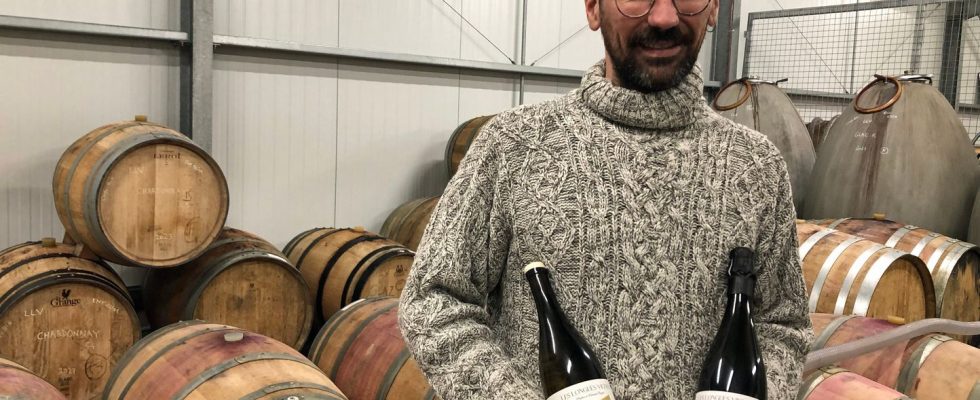By Toutatis ! Not content with drinking it, Brittany holding the national record for weekly consumption of wine*, the Bretons are now starting to produce it. And even good ones, if we are to believe the French wine review. In his 2024 list, the editorial staff of the prestigious magazine, which serves as a reference in the wine world, has just distinguished a Breton winegrower for the first time in its history. In this case Edouard Cazals, awarded the “Discovery of the Year” prize for his still wines Glaz and Ar Hir Gwini vintage 2022. “A Chardonnay astonishing in its finesse and gourmandise,” writes the review, praising “sincere and without deviance. »
For his first vintages, the young 33-year-old winemaker therefore hit the mark. “It obviously makes you happy to be recognized for the quality of your work,” he says in all modesty. After the ceremony, which was held on January 11 in Paris, things accelerated with orders pouring in from everywhere. “We were contacted by Michelin-starred restaurants in the United States and Denmark,” he explains. Unfortunately, there won’t be a drink for everyone. Because on his Longues Vignes estate, where four hectares of vines overlook the Rance in Saint-Jouan-des-Guérets, near Saint-Malo, Edouard Cazals and his partner Pauline focus more on quality than quantity. The 6,500 bottles of the 2022 vintage have already all been sold and the 13,000 bottles of the 2023 vintage are “going very quickly”.
Breton wine banned from sale until 2016
The first critically acclaimed Breton winemaker, Edouard Cazals above all acts as a pioneer. Because by planting his first vines of chardonnay, pinot noir and grolleau in 2019 in this charming corner of Ille-et-Vilaine, this Norman native became, without necessarily wanting to, the first professional winemaker in Brittany, in administrative sense that is clear. An adventure made possible by the European Union, which in 2016 approved the liberalization of vine planting rights. From then on, it became legal to produce and sell wine in Brittany, which had been prohibited since the 1930s. “Many young people who were already working in the wine world therefore took this opportunity to settle in the region,” welcomes Rémy Ferrand, president of the Association for the recognition of Breton wines (ARVB), a group of passionate wine lovers.
In a region better known for cider, beer or chouchen, the vineyard is rising from its ashes with teeming projects. “The sector is emerging but booming,” confirms Aurélien Berthou, vice-president of the Association of Breton Winegrowers (AVB), which already has around thirty members. Like this winegrower, who planted nearly three hectares of vines in 2022 in the Auray region, many have set their sights on Morbihan. Not so much for the idyllic setting as for the climate of southern Brittany “comparable today to that of Angers or the Pays Nantais a few years ago”, underlines Aurélien Berthou.
“We won’t have vintages or grands crus anytime soon”
In addition to the change in regulations, it is therefore global warming which explains this rush for vines in Brittany. “It’s unfortunate to say that, but without this rise in temperatures, it would be more complicated to make wine here,” recognizes the vice-president of the AVB, who wants to make Brittany “a wine-producing land in the coming years.” years. » But not enough to shake the major wine-producing regions for the moment. “We are still very small, winegrowers in diapers,” smiles the Auray winegrower. We have around a hundred hectares of vines throughout the region, compared to 8,000 hectares in the Nantes vineyards, so we are not at all on the same scale. »
Apart from those of Edouard Cazals, the only Breton winemaker with Mathieu Le Saux, based on the island of Groix, to sell bottles, it is however impossible to predict the quality of Breton wines. “These are still very young vines, so we won’t have vintages or grands crus anytime soon,” warns Rémy Ferrand. We will focus more on local wines with youth and freshness. Quality will then be achieved over time. But it’s in any case very exciting, all this excitement! »
* It is always good to remember that alcohol abuse is dangerous for your health. Breton wine should therefore be consumed in moderation.

